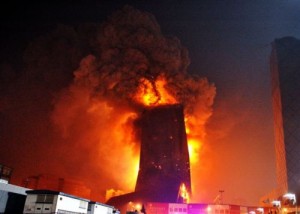Wait. That is not my theory, but that of the author of an article written more than four years ago that a reader pointed me to and that I recommend you read. Not because it’s necessarily right, but because it’s fascinating to see where we actually stand four years after the writer’s prediction.
Today, the currency and export policy of China is anchored around its peg to the dollar. The main reason for this is that by artificially undervaluing its own currency, and therefore overvaluing the dollar, China artificially stimulates its manufacturing exports. The second reason is that by buying the excess U.S. dollars and reinvesting them in U.S. government bonds, it acts as a foreign lender to the United States. The third reason is that this foreign lending stimulates American demand for Chinese manufacturing exports and allows the Chinese government to relieve its current unemployment problems… No doubt, most of these loans will turn out to be very expensive because they will be repaid with greatly depreciated dollars, which in turn will exacerbate down the road the growing financial distress of the banking sector in China.
Therefore, it is clear that China travels today the road to Depression. How severe this depression will be, will critically depend on two developments. First, how much longer the Chinese government will pursue the inflationary policy, and second how doggedly it will fight the bust. The longer it expands and the more its fights the bust, the more likely it is that the Chinese Depression will turn into a Great Depression. Also, it is important to realize that just like America’s Great Depression in the 1930s triggered a worldwide Depression, similarly a Chinese Depression will trigger a bust in the U.S., and therefore a recession in the rest of the world.
Unless there is an unforeseen banking, currency, or a derivative crisis spreading throughout the world, it is my belief that the Chinese bust will occur sometime in 2008-2009, since the Chinese government will surely pursue expansionary policies until the 2008 Summer Olympic Games in China. By then, inflation will be most likely out of control, probably already in runaway mode, and the government will have no choice but to slam the brakes and induce contraction. In 1929 the expansion stopped in July, the stock market broke in October, and the economy collapsed in early 1930. Thus, providing for a latency period of approximately half a year between credit contraction and economic collapse, based on my Olympic Games timing, I would pinpoint the bust for 2009. Admittedly, this is a pure speculation on my part; naturally, the bust could occur sooner or later.
Of course, macro-economic predictions like this usually prove to be far off the mark (except those made by me), the most (in)famous perhaps being Gordon Chang’s prediction of “The Coming Collapse of China.” In the case of the article above, the story seems to have occurred almost in reverse – a US (and increasingly European) crisis is what is plunging the world into a recesion, not government-generated inflation in China. America’s economic crisis, not China’s, was the catalyst for the tailspin, and if China is be plunged into a depression, it will be for reasons very different from what the author envisaged. (He was shrewd enough to say that his theory might be offset by “an unforeseen banking, currency, or a derivative crisis spreading throughout the world.” And what we are seeing today was certainly unseen by most in 2004.)
However…however… I honestly believe China is going to be one of the few players that emerges from the current crisis relatively unscathed (and “relatively” is a key word.). Simply because of the size of its own domestic markets and the trade it carries out in Africa and Asia. It will suffer, lots of factories will continue to close and lots of dreams will be erased and jobs lost. But it won’t be depression. What it will be, more than anything else, is a test for the CCP. Running a country the size of China with the staggering problems is hard (to say the least), but it sure helps when the economy is roaring year after year.
One of the most frequently repeated motifs is that as long as the economy is kicking, most Chinese don’t give a damn about human rights and censorship and corruption. Once things slow down and people have more time (and more fear), as they see their opportunities dimming, as they realize the joy ride they were counting on was finite while the ruling classes are doing just fine – will they lose some of that Zhongguo jia you spirit and begin to demand their government do better? Will they look at they way America ousted the Republicans, and demand that same freedom? Short answer: probably not; at least not yet. China is better positioned to weather the current storm without enough rampant misery in the cards to get people thinking about revolution. The government can still spend its way out of this mess they way it usually does. One day China will face an economic moment of truth, the way America is facing one now. I’m pretty sure this isn’t it. Yet.
I swore I wouldn’t post anything today, that I’d focus only on my homework. The Internet is such a monumental distraction. And that will be the subject of an upcoming new post.


Comments